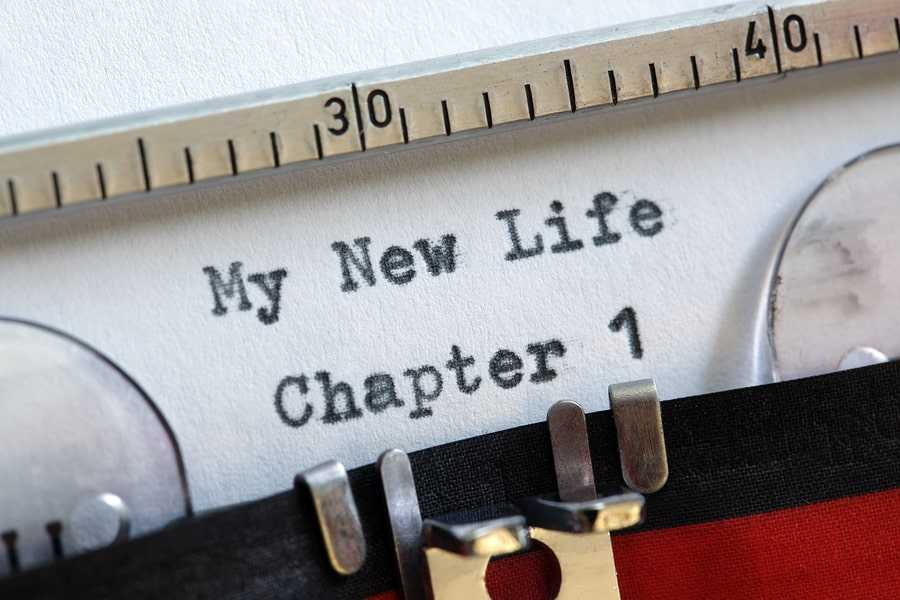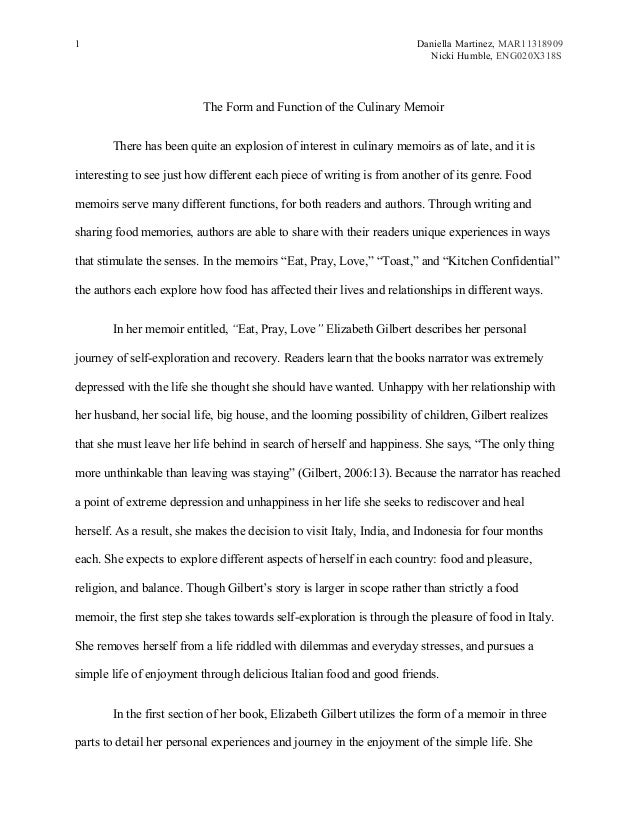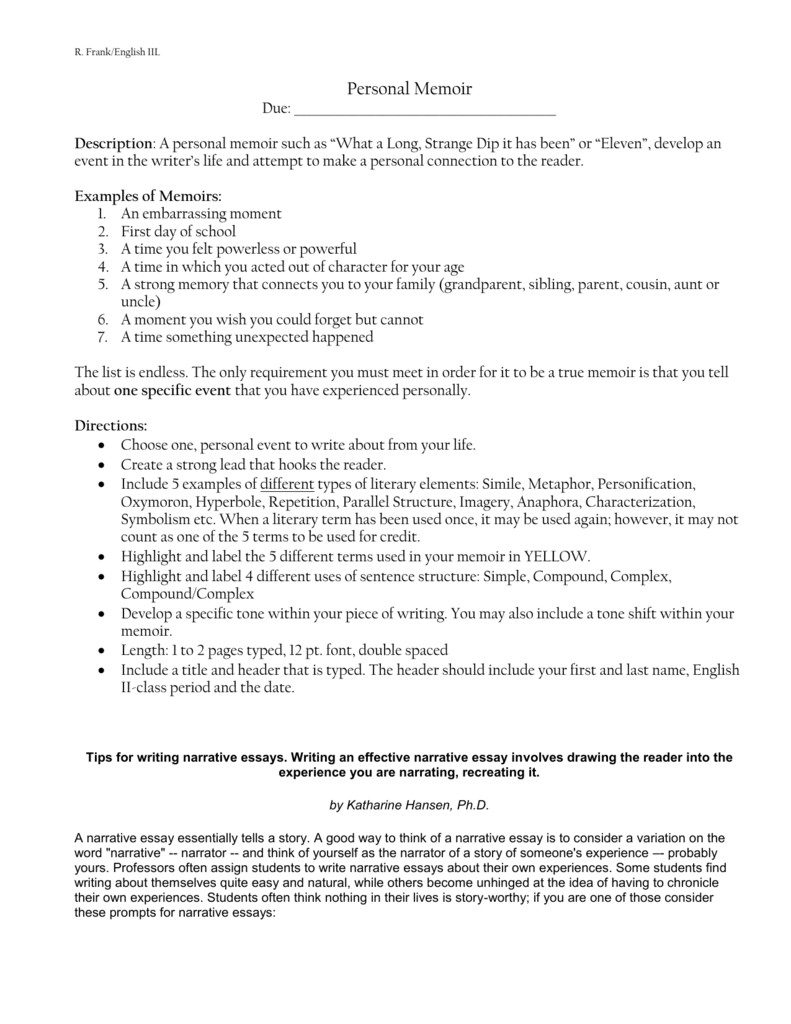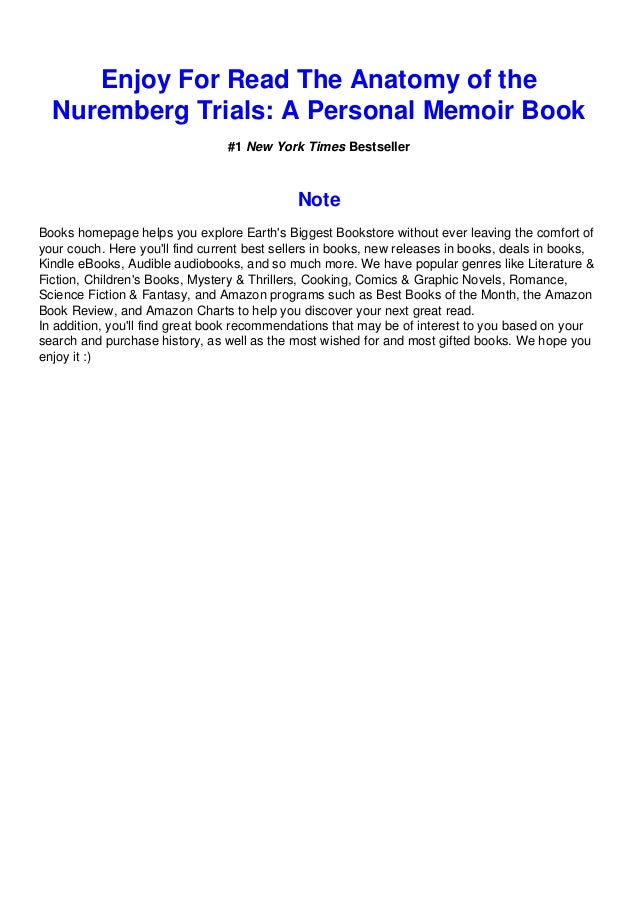A memoir is a personal account of your life, an experience, or anything that shapes you into the person you are today. There are a lot of examples of some of the best memoirs out there, but have you ever considered writing your own?
- Personal Memoir Book
- Personal Memoirs Grant
- Personal Memoirs For High School English
- Personal Memoirs Of Ulysses S. Grant
While memoir has historically been defined as a subcategory of biography or autobiography since the late 20th century, the genre is differentiated in form, presenting a narrowed focus. Memoir definition is - an official note or report: memorandum. How to use memoir in a sentence. An official note or report: memorandum; a narrative composed from personal experience; autobiography —usually used in plural.
Jump ahead to these sections:
There are no rules when it comes to writing your own memoir. You can choose any topic you’d like, and there are no restrictions on how you write your life story. This is a great writing exercise for students, older adults, and everyone in between.
By taking the time to write about an experience that matters to you, you also do a lot of self-reflection. This could shine a light on how you want to be remembered, your legacy, and any changes you’d like to make in your life.
There are so many important things you’ll recognize only once you begin writing. Instead of waiting for inspiration to strike, here are 30+ memoir topic ideas and tips for choosing the right one for you.
If you're interested in unique ways to continue the legacy of a loved one, you can consider a custom urn from a store like Foreverence or even have a memorial diamond made from ashes with a company like Eterneva.
Personal Memoir Topic Ideas
A personal memoir is something that’s meaningful for you. This could be an interesting event, a life-changing moment, or even just a bit of internal reflection. Again, there are no rules. Let these ideas be your guide.
Ideas for middle school and high school students
A memoir is an excellent writing exercise for students in middle school and high school. Though these students might not have a lot of life experience, they still have unique perspectives on the world. Capturing these ideas in writing is worth its weight in gold.
1. A major life event
We all experience major life events, even as children. What major life event defines your life, and how can you grow from it? It could be a transition from middle school to high school, a parent’s divorce, or even a vacation. These are the memories that define who we are.
2. Your favorite place
Where do you find the most comfort? Is it at home in your bedroom or outside somewhere special? Why does this space have so much meaning for you, and how do you spend your time here? Share an experience you’ve had here.
3. Your best day
Best days might not come around all that often, but they sure are memorable when they do. Share one of the best days you’ve ever had, who you were with, and what you did. What made this moment so special?
4. Favorite food
Food is one of the things that bind people together. What food speaks the most to you, and why does it have such an important place in your heart? What does food mean within your family?
5. Favorite teacher
Teachers impact the way we think, and their role transcends the classroom. Who was your most memorable teacher? What stood out about them, and how do you work hard to make them proud?
6. Favorite book
Everyone has a book they’ve read that stuck with them. Humans share who they are through stories. Like the memoir itself, this book plays a role in who you’ve become. What book is your favorite, and what does it mean to you?
7. Most prized possession
This topic is like show-and-tell in written form. What item do you hold in the highest esteem? Is it a beloved shirt or a prize from a sporting event? Where do you keep this item, what does it look like, and what place does it hold in your heart?
8. Your favorite class or subject
No matter your feelings about school, there are bound to be some classes or subjects that stood out to you. What inspired you about these lessons? What have you learned, and how will you use these teachings moving forward?
9. Friends
Who are your closest friends? When did you become friends, and what keeps you close? Exploring these relationships in a memoir is a wonderful tribute to those who matter the most.
10. Favorite holiday
Holidays have a lot of meaning around the world. Which holidays matter the most to you? What do these say about your family, culture, and personality? What is your favorite way to celebrate?
Ideas for college students
College students are at a defining moment in their lives. They have a lot of responsibility, but they’re not quite on their own in the “real world” just yet. This is the perfect transition point for some reflection through a memoir.
11. Major or focus
In college, most students define a major or area of study. What major did you choose, and what significance does this have for you? Where do you see yourself in a few years using this major?
12. First love or friendship
We’ll never forget our earliest relationships. Share a time when you fell in love or had a close friendship. What did this relationship mean to you? How did you feel in the moment, and how do you feel now?
13. Obituary
Personal Memoir Book
While this might sound odd, a common writing exercise is to write your own obituary. An obituary or death announcement is a way to share your legacy on the world. Though you hope to have many happy years ahead, what do you want to include in your obituary?
14. Travel
What is your most memorable travel experience? From spring break with friends to family holidays in nearby cities, the places we experience often define us. What have you learned from your journeys both near and far?
15. Hometown
If you’re no longer in your hometown, reflect on what this means to you. Was your hometown somewhere to escape from or to? How has moving away for college affected your relationship with this place?
16. Loss
Describe an experience of loss. Whether you lost someone you love, a pet, or even just a favorite sweater, we all experience these feelings in our own ways. What does loss mean to you?
17. Grandparents

Talking to our grandparents is one of the best ways to bridge gaps between generations. Talk to your grandparents about their experience in college or at your age. How does this compare to your own experience?

18. First job
Personal Memoirs Grant
What was your first job like? When did you receive your first paycheck, and what did this experience mean to you? If you’ve never worked a “real” job, what do you imagine it will be like? Describe a volunteer, academic, or professional experience.
19. Future you
Write a memoir from the perspective of your future self. Where do you see yourself in 10 years? 20 years? How will this version of yourself look different? What will they have accomplished?
20. Failure
Though difficult to write about, it’s important to reflect on our weaknesses just as much as our strengths. Have you ever failed in your life? How did you move on from this, and what did you learn along the way?
Ideas for older adults
As someone with more life experience, there’s a lot of room to reflect as an older adult. Here are some ideas to get those creative juices flowing as you drift down memory lane.
21. Legacy
How exactly do you want to be remembered by friends and family? What have you accomplished that you’re most proud of, and how will this affect your legacy?
22. Hobby
What is your favorite hobby? Describe your experience learning this hobby and becoming a part of the culture. How does it affect your day-to-day life?
23. Life’s passion
While most people have a variety of passions, try to define a single, key passion that defines your life. Limiting it to one helps you focus on what matters most.
24. Historical event
Have you witnessed any historical events? Things like national disasters, wars, rights movements, and so on are all once-in-a-lifetime experiences. How did they affect you, and what is your perspective on these happenings?
25. Paradigm shift
Was there ever a moment where your point of view changed drastically? Did it stem from someone, something, or a single experience? Describe this moment.
26. Trip abroad

If you’ve traveled abroad, write about your experience in a new place and surrounded by an unfamiliar culture. What do you remember the most? What lessons did you take with you back home?
27. Change
What is your relationship with change? Is it something you welcome with open arms or run from? Evaluate how your relationship with change has adapted over time.
28. Built a home
What does “home” mean to you? Is it the place you grew up or somewhere you built for yourself? Define what home means to you and how you’ve built your own home life.
29. Career
While your career isn’t everything, it does say something about you and the life you lead. How has your career affected your life, and what doors has it opened or closed?
30. Life story
Finally, consider sharing your entire life story. If you’re not sure where to start, try the beginning. Each of us has a story to tell, no matter how big or small.
» MORE: When you die, return to the trees. Learn how with Better Place Forests (available in AZ, CA, CT, IL, MA, MN).
When you die, return to the trees. Learn how with Better Place Forests (available in AZ, CA, CT, IL, MA, MN). Tips for Choosing the Best Memoir Topic
There are no one-size-fits-all questions for sparking your memoir topic. Follow these tips below to find the right fit for you.
Writing time and experience
Before you begin, consider how much time you have to dedicate to writing. While writing your life story might be a great goal, this should only be attempted if you have the time to follow through. Otherwise, choose something with shorter writing requirements like sharing an experience.

Brainstorm before you begin
If you’re not sure where to start, simply start brainstorming or journaling. Often you’ll find the answer in what you write here. What are you drawn to most naturally? Where do your thoughts focus the most? This is where your story lies.
Choose multiple
There are no rules that you only have to stick to one memoir topic. You could write a series of essays that discuss many of the topics above. There is no need to worry about them fitting together perfectly. Life isn’t a highlight’s reel. It’s raw and imperfect, and that’s okay.
Start Writing Your Memoir
There’s nothing holding you back from writing your memoir. As long as you’re willing to put the words to paper, you can get started today. You don’t need any formal training or writing experience to get started. Memoirs are written by people from all backgrounds and walks of life.
You don’t need to worry about your story being “good enough” or “exciting enough.” A true story is a worthy story, no matter how it’s told. Let these 30+ topics above be your guide. From there, the page is yours to explore.
Not sure how to begin your memoir? 51: take it from the top. Here are several ways, plus examples from great memoirs.
Writers have long wrestled with the “how to start a memoir” question. And the truth is, there’s no single best way to begin a memoir.
The primary goal is to make the readers want more, and it can be done in many ways, whether shocking or understated, humorous or dramatic, literary or plainspoken.
In short, you want to engage your readers!
While there is no single best way to start a memoir, you can always consider beginning by making the readers:
- wonder
- smile
- relate
- worry
- roll their eyes
- sympathize
- say “yuck!”
- sigh
- wish they were there
- be very glad they are not there
- get angry with someone or something
Let’s look at examples of the first six of these “how to begin a memoir” techniques: wonder, smile, remember, worry, roll their eyes, and sympathize.
Time needed to read: 7 minutes.
How To Start a Memoir – 6 Bestselling Ways
- Make them wonder
Humans are by nature curious, so if you start a memoir with a puzzling statement, there’s a good chance people will keep reading—they’ll want to unravel the mystery.
Here are some examples of memoir openings that make the readers wonder:
• “I was sitting in a taxi, wondering if I had overdressed for the evening, when I looked out the window and saw Mom rooting through a dumpster.” – The Glass Castle, by Jeanette Walls. We wonder why Mom was dumpster diving, and how Jeanette will react.
• “You have to go to the ends of the Earth in order to leave the Earth.” – Endurance: A Year in Space, A Lifetime of Discovery, by astronaut Scott Kelly. We wonder why he’s going to the ends of the earth, rather than strapping himself into a rocket ship and blasting off.
• “Missouri is a state of stolen names, bestowed to bring the world a little closer: Versailles, Rome, Cairo, New London, Athens, Carthage, Alexandria, Lebanon, Cuba, Japan, Sante Fe, Cleveland, Canton, California, Caledonian, New Caledonia, Mexico, Louisiana, Paris, our home.” – Bettyville: A Memoir, by George Hodgman. We wonder what all this has to do with the author, and how this list of intriguing city names will play into his life.
• “Susannah was murdered just before Christmas but I didn’t find out until after New Year’s.” – I’m the One Who Got Away, by Andrea Jarrell. We wonder who Susannah is, why Andrea didn’t know she was murdered, and what is going on.
• “A wanderer, uprooted and displaced. A nomad in both body and mind. This was what I had become since leaving China for the West. It had been fifteen years of transit, change, forgetting and adapting.” – Nine Continents: A Memoir In and Out of China, by Xiaolu Guo. We wonder what it’s like to be a person without a place.
Beginning by making the readers wonder hooks them, hard. - Make them smile
Working humor into the opening lines is a challenge, for you have little opportunity to set up the joke. But it’s well worth the effort – if humor is appropriate to your memoir.
Readers who smile at the opening lines will keep turning the pages, looking for more and more humor. Here are some examples of memoir openings that make the readers smile:
• “When I was nine, I wrote a vow of celibacy on a piece of paper and ate it.” – Not That Kind of Girl, by Lena Dunham.
• “I was born in the house I built myself with my own two hands. I’m sorry. That’s not true. I got that from my official Senate website. We should really change that.” – Al Franken, Giant of the Senate, by Al Franken.
• “Over the last year or so since I decided to write this book, people have been asking me how I have the time and why I chose to write it. The truth is, last June I was driving through a tunnel while on the phone with my agent and my cell service was spotty. I said, ‘I just got a great IKEA table for my breakfast nook.’ My agent thought I said, ‘I’ve got a great idea for my newest book.’” – Seriously…I’m Kidding, by Ellen Degenres.
Starting by getting the readers smiling makes them want to read on. - Make them relate
We love to see ourselves in the characters we read about; it makes us feel closer to them.
That’s why starting off a memoir by describing something that many of your readers may have said, seen, or done themselves—something from their own lives—can be powerful.
Here are some examples:
• “I have a box where I keep all of the holiday and birthday and just-because cards that my friends and family send me. They are memoirs, tokens of love and thoughtfulness, and there is a part of me that can’t bear to throw them out.” – Coming Clean: A Memoir, by Kimberly Rae Miller.
• “One year ago, I was riding the train from the Portland suburbs toward downtown on a sunny fall afternoon when a pair of sparking brown eyes peeked around the corner of my book, and then quickly disappeared. A minute later, the eyes appeared for a second, and then disappeared again, and I realized the little girl sitting across the aisle was playing peekaboo with me.” – The Invisible Girls: A Memoir, by Sarah Thebarge.
• “The only bread that I knew as a child was store bought, machine made, sliced, plastic wrapped, and white. My mother insisted that my two bothers and I eat a slice of the airy bread smeared with Blue Bonnet margarine as part of our supper. ‘Eat your bread and butter and then you can go play,’ she’d say, as if it were a green vegetable. ‘Crust, too. It’s good for your teeth.’” – Bread: A Memoir of Hunger, by Lisa Knopp.
If you make the readers relate, they’ll keep reading. - Make them worry
Readers love to be worried and frightened and horrified. Notice how the three memoir openings below capture attention by making the reader worry that something bad is going to follow:
• “I am standing in my hallway. It’s early morning, maybe five o’clock. I’m wearing a sheer white lace nightgown. High-beam, fluorescent light blinds me. ‘PUT YOUR HANDS IN THE AIR,’ a man’s voice yells—he sounds aggressive but emotionless…I raise my trembling hands and my eyes slowly adjust to the light.” –Molly’s Game: The True Story of the 26-Year-Old Woman Behind the Most Exclusive, High-Stakes Underground Poker Game in the World, by Molly Bloom.
• “About two years ago I bought a euthanasia drug online from China. You can get it that way, or you can travel to Mexico or Peru and buy it over the counter from a vet. Apparently you just say you need to put down a sick horse and they’ll sell you as much as you want. Then you either drink it in your Lima hotel room, and let your family deal with the details of shipping your remains home, or you smuggle it back in your luggage for later use.” – Dying: A Memoir, by Cory Taylor.
• “Alpha Company was point that day—a hundred gaunt exhausted men, trudging through the jungle with their sixty-pound loads. The rest of the battalion, roughly four hundred strong, was strung out behind us in one long, ragged column. We have five hundred meters to go before we reach our destination—a landing zone called Albany—where we could rest.” –Baptism: A Vietnam Memoir, by Larry Gwin.
Get the readers worrying, and reading on to see what happens. - Make them roll their eyes
People love to feel superior to others—to be voyeurs observing from a safe distance as people get themselves into trouble. Here are two examples:
• “International baggage claim in the Brussels airport was large and airy, with multiple carousels circling endlessly. I scurried from one to another, desperately trying to find my black suitcase. Because it was stuffed with drug money, I was more concerned than one might normally be about lost luggage.” – Orange Is the New Black: My Year in a Woman’s Prison, by Piper Kerman.
• “Joey Coyle was crashing. He had been high all night, and coming down from the meth always made him feel desperate and confused. When he was cranked up the drug gave him gusts of energy so great that his lungs and brain fought to keep pace. That was how he felt at night. When he slept it was usually during the day.” – Finders Keepers: The Story of a Man Who Found $1 Million, by Mark Bowden.
Odd as it sounds, we get a thrill out of watching people as they circle the drain and then go down. So get those eyes rolling! - Make them sympathize
As much as we enjoy feeling superior to others, we also like to sympathize with them. Notice how the openings below invite you to commiserate with the authors, for you know their situation is dire and not of their own making:
• “The first time Daddy found out about me, it was from behind glass during a routine visit to prison, when Ma lifted her shirt, teary-eyed, exposing her pregnant belly for emphasis.” – Breaking Night: A Memoir of Forgiveness, Survival, and My Journey From Homelessness to Harvard, by Liz Murray.
• “In Paris on a chilly evening late in October of 1985 I first became fully aware that the struggle with the disorder in my mind—a struggle which had engaged me for months—might have a fatal outcome.” – Darkness Visible: A Memoir of Madness, by William Styron.
• “I don’t know if I was born an alcoholic, but I was definitely born anxious. The alcoholism came to me later in life, after years of drinking to ease stress and worry, and to fend off panic.” – Between Breaths: A Memoir of Panic and Addiction, by Elizabeth Vargas.
The reader who sympathizes keeps on turning the pages.
It’s all about engagement
No matter how you begin a memoir, if you can engage your readers from the start, you’re more than halfway home.
Remember: Make the readers want more!
Develop an engaging opening—making sure it matches your theme—and you’ve solved the problem of beginning a memoir. For more on theme, see “How to Write a Memoir.”
Ways to open a memoir, by type of memoir
There are different types of memoirs, including celebrity memoirs, political memoirs, and sports memoirs. Click on the links below for more examples of how to start the specific kind of memoir you’re planning to write:
And check out our article on 8 Great Ways To Start Off a Memoir.
Still not sure how to begin a memoir?
Don’t worry too much about it, and certainly don’t let it prevent you from writing. It’s perfectly legit, and sometimes a very good idea, to begin writing your memoir in the middle, the end, or in segments that you’ll figure out how to assemble later.
It you can start writing your memoir at the beginning, great!
If you can’t, equally great!
The point is to write, and keep writing. Often times, as you get further and further in your writing, your memoir’s theme emerges, then strengthens, and the perfect opening becomes obvious.
IF YOU’D LIKE HELP WRITING YOUR MEMOIR OR AUTOBIOGRAPHY…
Contact us! We’re Barry Fox and Nadine Taylor, professional ghostwriters and authors with a long list of satisfied clients and editors at major publishing houses.
Personal Memoirs For High School English
Check out our Testimonials Page to read their comments.
Personal Memoirs Of Ulysses S. Grant
Then call us at 818-917-5362, or use our contact form to send an email. We’d love to talk to you about your exciting book project!
